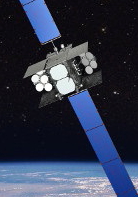|
Boeing says its eighth Wideband Global
SATCOM (WGS) satellite will provide nearly twice as much
communications bandwidth as previous WGS satellites due to an
upgraded digital payload.
WGS-8, which was launched on Wednesday by a
United Launch Alliance Delta IV rocket, will aid in fulfilling
the increasing demand for high-data rate communications of
military around the globe.

�Not only does WGS-8�s
cutting edge digital payload nearly double the satellite�s
bandwidth, but the U.S. government was able to realize more than
$150 million in savings for WGS-7 through WGS-10 through
fixed-price block purchases and commercial operating practices,�
said Dan Hart, Boeing vice president, Government Satellite
Systems. �We�ve been able to both increase the capability and
reduce the per-unit cost with each new WGS satellite we�ve
delivered, making WGS, by far, the most cost-effective asset for
military communications.�
During the past two years Boeing
has made significant improvements to its satellite products. Those
include increasing bandwidth and capacity, incorporating
independently steerable and shapeable beams that can point
bandwidth to where it�s most needed, deploying all-electric propulsion satellites, and stacking and launching
together two satellites.
The WGS-9
satellite, funded through an international partnership between the
United States, Canada, Denmark, Luxembourg, Netherlands and
New Zealand will be launched early next year.
Boeing is on
contract for a total of 10 WGS satellites.
See other recent
news regarding:
Boeing,
Satellites.
|

